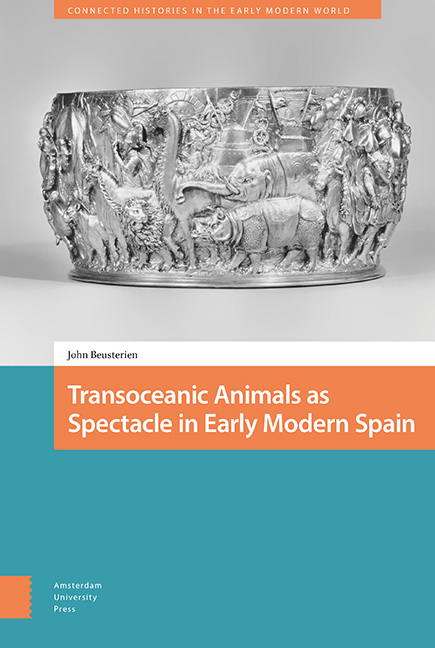Book contents
- Frontmatter
- Dedication
- Contents
- List of Illustrations
- Prologue
- Introduction: Armored Beasts and the Elephant in the Room
- 1 Hawa’i the Elephant and Abada the Rhinoceros
- 2 Fuleco the Armadillo
- 3 Jarama the Bull and Maghreb the Lion
- Conclusion: Biogeography as a Teaching Tool
- Appendix 1 Biogeography Course Project: Naming an Early Modern Animal
- Appendix 2 Bibliography for the Study of Animals and Early Modern Spain
- Index
Introduction: Armored Beasts and the Elephant in the Room
Published online by Cambridge University Press: 21 November 2020
- Frontmatter
- Dedication
- Contents
- List of Illustrations
- Prologue
- Introduction: Armored Beasts and the Elephant in the Room
- 1 Hawa’i the Elephant and Abada the Rhinoceros
- 2 Fuleco the Armadillo
- 3 Jarama the Bull and Maghreb the Lion
- Conclusion: Biogeography as a Teaching Tool
- Appendix 1 Biogeography Course Project: Naming an Early Modern Animal
- Appendix 2 Bibliography for the Study of Animals and Early Modern Spain
- Index
Summary
Abstract
Animal spectacles are important for a holistic understanding of early modern Spanish culture. Influenced by Albrecht Dürer's Rhinoceros, early modern Spain celebrated itself as a planetary world power through the spectacles of an exotic elephant, rhinoceros, armadillo, and lion. Also, partially due its role as a foil to the positing of animals as exotic, Spain created a spectacle of a homegrown bull. This chapter asserts the importance of deploying the methodology of a biogeography for one of each of these species, all of whom played a role as an animal protagonist in a spectacle. The writing of biogeographies takes the extinction of species in the Anthropocene into account and, in contrast to the negative impact of each animal's role as an object in a spectacle, places an emphasis on an earth ethics that fosters healthy animal-human communities.
Keywords: animal spectacles, early modern Spain, biogeography, Anthropocene, exotic animal, earth ethics, Albrecht Dürer (1471–1528)
On May 18, 1969, Apollo 10 shot a picture that captured the entire Earth from outer space. The astronaut reduced the Earth to the frame of a lens with a finger click of the camera. The image—a blue orb mottled with white clouds and some brown swatches delineating part of Mexico and the Gulf of California—turned the Earth into humanity's absolute other. The absolute othering of the Earth in a photograph, however, also made the Earth absolutely human. The wholly other, as psychoanalysis teaches, now inhabited as the most familiar. The Earth took on a decidedly human form.
Earth anthropomorphosis, the transformation of the Earth into a human being, is not a backwards premodern or animist vision, but places the Earth at the forefront of new paradigms in different academic fields. Shaping broad-ranged thinking in the field of science, the simultaneous distancing of the Earth as object and its subsequent closeness as subject stimulated the Gaia hypothesis. Following chemist James Lovelock (1919–) and then microbiologist Lynn Margulis (1938–2011), philosophers of science coined the Gaia hypothesis to propose an earth ethics in which all organisms and their inorganic surroundings on Earth are closely integrated and form a single and self-regulating complex system.
- Type
- Chapter
- Information
- Transoceanic Animals as Spectacle in Early Modern Spain , pp. 15 - 34Publisher: Amsterdam University PressPrint publication year: 2020



